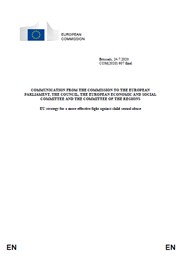The EU Charter of Fundamental Rights recognises that children have the right to such protection and care as is necessary for their well-being, among other provisions. The 1989 UN Convention on the Rights of the Child establishes the right of the child to be protected from all forms of violence. Child sexual abuse is a particularly serious crime that has wide-ranging and serious life-long consequences for victims. In hurting children, these crimes also cause significant and long-term social harm. In many cases, children are sexually abused by persons they know and trust, and on whom they are dependent. This makes these crimes particularly difficult to prevent and detect. There are indications that the COVID-19 crisis has exacerbated the problem, especially for children who live with their abusers. In addition, children are spending more time than before online, possibly unsupervised. While this has allowed them to continue their educational studies and stay in touch with their peers, there are signs of increased risk of children coming into contact with online predators. With more offenders isolated at home, the demand for child sexual abuse material has increased (e.g. by 25% in some Member States), which in turn leads to increased demand for new material, and therefore new abuses. The Council of Europe estimates that in Europe, one in five children fall victim to some form of sexual violence. Sexual abuse and sexual exploitation of children can take multiple forms and they can occur both online (e.g. forcing a child to engage in sexual activities via live streaming or exchanging child sexual abuse material online) and offline (e.g. engaging in sexual activities with a child or causing a child to participate in child prostitution). When the abuse is also recorded and shared online, the harm is perpetuated. Victims have to live with the knowledge that images and videos of the crimes showing the worst moments of their lives are being circulated and anyone, including their friends or relatives, may see them. The exponential development of the digital world has been abused making this crime a truly global one, and has unfortunately facilitated the creation of a global market for child sexual abuse material. The past few years have seen a dramatic increase in reports of child sexual abuse online concerning the EU (e.g. images exchanged in the EU, victims in the EU, etc.): from 23 000 in 2010 to more than 725 000 in 2019, which included more than 3 million images and videos. A similarly dramatic increase has occurred globally: from 1 million, reports in 2010 to almost 17 million in 2019, which included nearly 70 million images and videos indicate that the EU has become the largest host of child sexual abuse material globally (from more than half in 2016 to more than two thirds in 2019). Recently, an investigation into child sexual abuse in Germany resulted in the discovery of potentially more than 30 000 suspects using group chats and messenger services to share materials, incite each other to create new materials, and exchange tips and tricks on how to groom victims and hide their actions. The use of end-to-end encryption makes identifying perpetrators more difficult if not impossible. In this particular example, to date, only 72 suspects in Germany have been dentified and 44 victims.

